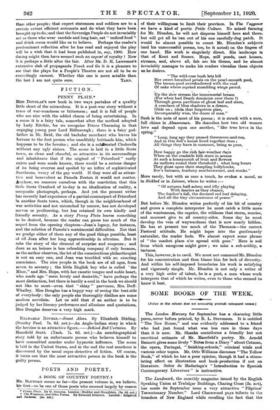POETS AND POETRY.
A BOOK OF COUNTRY POETRY.?
Ma. BLmcDEN seems so far—the present volume is, we believe, his first—to bo one of those poets who succeed largely by reason • Penny Plain. By 0. Douglas. London : Hodder and Stoughton. [Ss. M. nett t The Waggoner, and Other Poems. By Edmund Blunden. London: BIdgwick Sad Jackson. 15s. net.] of their willingness to limit their province. In The 'Vaggoner we have a kind of poetic Petite Culture. No mixed farming for Mr. Blunden, he will not disperse himself here and there, but will get all he can out of his one carefully-dug patch. It would be almost possible to count Mr. Blunden's subjects (and his unsuccessful poems, too, be it noted) on the fingers of one hand. His work is singularly direct. His landscape is that of Kent and Sussex. Hops, mill ponds, oast houses, streams, and, above all, fish are his theme, and he almost invariably manages to make his readers visualize these objects a$-he desires.
" The wild-rose bush lets loll Her sweet-breathed petals on the pearl-smooth pool, The bream-pool overshadowed with the cool Of oaks where myriad mumbling wings patrol.
Up the slow stream the immemorial bream (For when had Death dominion over them ?) Through green pavilions of ghost leaf and stem, A conclave of blue shadows in a dream, Glide on ; idols that forgotten plan, Incomparably wise, the doom of man."
Such is the note of most of his poems ; it is struck with a sure, full chime in Almswomen. He describes how two old women lave and depend upon one another, " like true loves in the spring."
" Long, long ago they passed threescore-and-ten, And in this doll's house lived together then ; All things they have in common, being so poor, How happy go the rich fair-weather days When on the roadside folk stare in amaze At such a honeycomb of fruit and flowers As mellows round their threshold ; what long hours
They gloat upon their steepling hollyhocks,
Bee's balsams, feathery southernwood, and stocks."
More rarely, but with as sure a touch, he evokes a mood, as in Sickbed or in Leisure, where he writes :— " Of autumn half-asleep and idly playing With fancies as they chance,
The feather's fall, the doomed red leaf delaying, And all the tiny circumstance of peace."
But before Mr. Blunden writes perfectly of his bit of country and grows a complete interpreter he must catch a little more of the wantonness, the caprice, the wildness that storm, sunrise, and moonset give to all country-sides. Some day he must develop the vein of waywardness that is now nearly hidden. He has at present too much of the Thomson—the correct Pastoral attitude. He might lapse into the gentlemanly naturalist, the reader feels. We almost expect some phrase of " the market place o'er spread with poor." Here is soil from which smugness might grow ; we miss a sub-acidity, a tartness.
This, however, is to cavil. We must not commend Mr. Blunden for his concentration and then blame him for lack of diversity. And within his self-imposed boundaries his work is satisfying and vigorously simple. Mr. Blunden is not only a writer of a very high order of talent, he is a poet, a man whose work interprets that of which he writes, even to those who seemed to know it best.


































 Previous page
Previous page